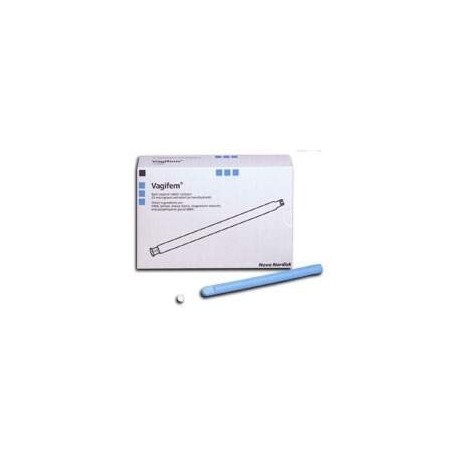 View larger
View larger Vagifem Vaginal Tablets 10 Mcg 18 Tablets ingredient Estradiol
VF3412D
New product
BUY MORE PAY LESS
| Quantity | Discount | |
|---|---|---|
| 2 | 5% | |
| 3 | 10% | |
| 4 | 15% | |
| 5 | 20% |
Volume discounts
| Quantity | Discount | You Save |
|---|---|---|
| 2 | 5% | Up to $5.90 |
| 3 | 10% | Up to $17.70 |
| 4 | 15% | Up to $35.40 |
| 5 | 20% | Up to $59.00 |
More info
4.1. Therapeutic indications
VAGIFEM is indicated for the treatment of estrogen-deficient vaginal atrophy.
to
4.2. Posology and method of administration
Posology/administration frequency and duration:
Initial dose: 1 vaginal tablet daily for 2 weeks.
Maintenance dose: 1 vaginal tablet 2 times a week.
Treatment can be started on any suitable day.
If a dose is missed, the missed dose should be taken as soon as the patient remembers. Repeated doses should be avoided.
For initiation and continuation of treatment of postmenopausal symptoms, the lowest effective dose should be used for the shortest duration (see also section 4.4).
VAGIFEM can be used in women with or without a uterus.
Minimal absorption may be observed during treatment, especially during the first 2 weeks, but the addition of a progestagen is not recommended as mean plasma estradiol levels will generally not exceed normal postmenopausal limits.
Method of Application:
VAGIFEM is applied intravaginally using the applicator.
to
Application
1. Open the blister pack from the piston part.
2. Push the applicator into the vagina until a resistance is felt (8-10 cm).
3. Release the tablet by pressing the plunger.
4.3. Contraindications
• Known, past or suspected breast cancer
• Known, past or suspected estrogen-dependent tumors (eg endometrial cancer)
• Undiagnosed genital bleeding
• Untreated endometrial hyperplasia
^ • Past idiopathic or current venous thromboembolism (deep vein thrombosis,
pulmonary embolism)
• Known hypersensitivity to any of the active substances or excipients in its composition.
• Porphyria
• Known liver dysfunction or disease
4.4. Special warnings and precautions for use
For the treatment of postmenopausal symptoms, HRT should only be started for symptoms that adversely affect quality of life. In all circumstances, a careful assessment of the risks and benefits should be made at least annually, and HRT should be continued only when the benefit outweighs the risk.
A complete personal and family history should be taken before initiating or reviewing hormone therapy. Physical (including breast and pelvis) examination should be performed under the guidance of this information, precautions for use and contraindications. During treatment, periodic check-ups, the frequency and method of which are adapted to each woman, are recommended. Women should be advised to report any changes in their breasts to their doctor or nurse. Examinations, including mammography, should be performed in accordance with current accepted screening practice and should be modified according to the individual's clinical needs.
Conditions to be followed
The patient should be closely monitored in the presence of any of the following conditions, if they have occurred previously, and/or if they have been exacerbated during pregnancy or previous hormone therapy. It should be noted that these conditions may reoccur or aggravate during systemic estrogen therapy, in particular:
• Leiomyoma (uterine fibroids) or endometriosis
• History of thromboembolic disorder or presence of risk factors (see below)
• Including risk factors in estrogen-dependent tumors (eg, 1st degree relatives of patients with breast cancer)
• Hypertension
• Liver disorders (eg liver adenoma)
• Diabetes mellitus with or without vascular involvement
• cholelithiasis
• Migraine or (severe) headache
• Systemic lupus erythematosus
• History of endometrial hyperplasia (see below)
• epilepsy
• Asthma
• Otosclerosis
Due to the local application of the low dose estradiol contained in VAGIFEM, recurrence or exacerbation of the above conditions is likely less than that seen with systemic estrogen therapy.
Reasons for immediate discontinuation of treatment
Treatment should be stopped in the presence of a contraindication and in the following cases:
• Jaundice or impaired liver function
• Significant increase in blood pressure
• New onset of migraine headache
• Pregnancy

